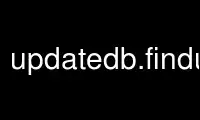
This is the command updatedb.findutils that can be run in the OnWorks free hosting provider using one of our multiple free online workstations such as Ubuntu Online, Fedora Online, Windows online emulator or MAC OS online emulator
PROGRAM:
NAME
updatedb - update a file name database
SYNOPSIS
updatedb [options]
DESCRIPTION
This manual page documents the GNU version of updatedb, which updates file name databases
used by GNU locate. The file name databases contain lists of files that were in
particular directory trees when the databases were last updated. The file name of the
default database is determined when locate and updatedb are configured and installed. The
frequency with which the databases are updated and the directories for which they contain
entries depend on how often updatedb is run, and with which arguments.
In networked environments, it often makes sense to build a database at the root of each
filesystem, containing the entries for that filesystem. updatedb is then run for each
filesystem on the fileserver where that filesystem is on a local disk, to prevent
thrashing the network. Users can select which databases locate searches using an
environment variable or command line option; see locate(1). Databases cannot be
concatenated together.
The @samp{LOCATGE02} database format was introduced in GNU findutils version 4.0 in order
to allow machines with different byte orderings to share the databases. GNU locate can
read both the old and @samp{LOCATE02} database formats, though support for the old pre-4.0
database format will be removed shortly.
OPTIONS
--findoptions='-option1 -option2...'
Global options to pass on to find. The environment variable FINDOPTIONS also sets
this value. Default is none.
--localpaths='path1 path2...'
Non-network directories to put in the database. Default is /.
--netpaths='path1 path2...'
Network (NFS, AFS, RFS, etc.) directories to put in the database. The environment
variable NETPATHS also sets this value. Default is none.
--prunepaths='path1 path2...'
Directories to not put in the database, which would otherwise be. Remove any
trailing slashes from the path names, otherwise updatedb won´t recognise the paths
you want to omit (because it uses them as regular expression patterns). The
environment variable PRUNEPATHS also sets this value. Default is /tmp /usr/tmp
/var/tmp /afs.
--prunefs='path...'
File systems to not put in the database, which would otherwise be. Note that files
are pruned when a file system is reached; any file system mounted under an
undesired file system will be ignored. The environment variable PRUNEFS also sets
this value. Default is nfs NFS proc.
--output=dbfile
The database file to build. Default is system-dependent. In Debian GNU/Linux, the
default is /var/cache/locate/locatedb.
--localuser=user
The user to search non-network directories as, using su(1). Default is to search
the non-network directories as the current user. You can also use the environment
variable LOCALUSER to set this user.
--netuser=user
The user to search network directories as, using su(1). Default is daemon. You
can also use the environment variable NETUSER to set this user.
--dbformat=F
Create the database in format F. The default format is called LOCATE02.
Alternatively the slocate format is also supported. When the slocate format is in
use, the database produced is marked as having security level 1. If you want to
build a system-wide slocate database, you may want to run updatedb as root.
--version
Print the version number of updatedb and exit.
--help Print a summary of the options to updatedb and exit.
Use updatedb.findutils online using onworks.net services
